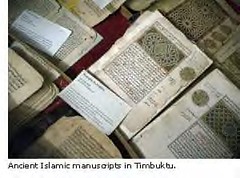
Timbuktu Ancient Islamic Manuscripts Are The Subject of Intensive Study and Interpretation
Originally uploaded by Pan-African News Wire Photo File
By Andrew Harding
BBC News, Timbuktu
A drizzle of dust and sand falls over Ahmed Saloum Boularaf's fingers as he gently lifts the ancient, camel-skin bound manuscripts from a wooden box and puts them on a desk in his makeshift library in a mud-brick house close to the centre of Timbuktu.
"Termites, rain and mice," he said in an accusing voice, brushing a few flecks of 15th Century parchment from his jacket.
"This was my grandfather's collection. It covers topics from science to medicine, history, theology, grammar, geography - a little of everything."
Threatened
Across Timbuktu, in cupboards, rusting chests, private collections and libraries, tens or perhaps hundreds of thousands of manuscripts bear witness to this legendary city's remarkable intellectual history, and by extension, to Africa's much overlooked pre-colonial heritage.
"This is the proof," said Mr Boularaf.
"Africa was not wild before the white man came. In fact, if you will excuse the expression, it was the colonising that was wild."
But this unique literary evidence is under threat, as time, the elements, and a simple lack of resources take their toll in northern Mali.
"We are losing manuscripts every day. We lack the financial means to catalogue and protect them," said Mr Boularaf, who recently rescued his collection from the rubble of a mud building next door that collapsed after a rainstorm.
Now a giant, new, state of the art library has landed - rather like a spaceship - in the dilapidated centre of Timbuktu, offering the best hope of preserving and analysing the town's literary treasures.
After several years of building and delays, the doors are finally about to open at the Ahmed Baba Institute's new home - a 200 million rand (£16,428,265) project paid for by the South African government.
"It's a dream come true," said South African curator Alexio Motsi, exploring the underground, climate-controlled storage rooms that will soon house some 30,000 manuscripts.
On the ground floor, behind elegant colonnades and fountains, rows of empty desks are ready for newly trained workers to begin repairing and digitizing the documents.
'African renaissance'
"I feel proud… and nervous," Mr Motsi said as his team prepared to hand over the keys of the institute to the Malian authorities.
The struggle to save Timbuktu's manuscripts has been gaining momentum for many years.
When South Africa's former President, Thabo Mbeki, visited the town in 2001 he declared the documents to be among the continent's "most important cultural treasures", and promised to help conserve them as part of his vision of an "African renaissance".
Most of the manuscripts are in Arabic script, but contain many local languages.
They provide unique insights into Timbuktu's emergence as a trading post, and by the 1500s as a famous university town, full of students and scribes.
They also help refute the notion that sub-Saharan Africa produced only oral histories, with little or no written records.
Some of the documents discuss social and political problems, usually in an Islamic context, while others offer medicinal advice, including one 13th Century herbal remedy to help treat women in labour.
"I think pre-colonial Africa had its own civilisation going on, which matches what was going on in the west," said Mr Motsi.
"There's a lot to be uncovered here. It's time we started relooking at the history we were taught in school about Africa."
The new institute plans to hold exhibitions, and open a souvenir and coffee shop in order to translate interest in the manuscripts into tourist revenue for one of the world's poorest countries.
But those ambitions will not have been helped by new travel advisories issued by the UK and US governments, which are warning tourists to steer clear of the town altogether because of the threat of kidnapping by militants with links to al-Qaeda, who are now using the Sahara as a hiding place.
Story from BBC NEWS:
http://news.bbc.co.uk/go/pr/fr/-/2/hi/africa/8386866.stm
Published: 2009/11/30 16:35:51 GMT
3 comments:
its really great to hear that they are saving there heritage. i like this article very much. thanks for sharing this with us...
quality inspection china
Perfumesnow is the best place to buy cheap perfumes that suit your own unique personality and taste. Our extensive collection of perfumes includes women perfumes, men perfumes and gift set perfume at reasonable price
New perfume for men
Very precious things in respect of Culture and Ancestors heritage.
You can also find much more information here Racism Articles
Post a Comment